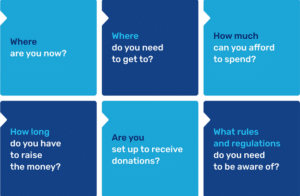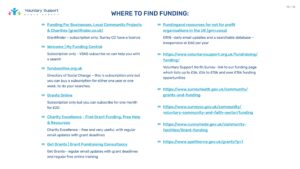Find out about local volunteering opportunities and keep up to date with local events & fundraising news by subscribing to one of our bulletins.
Charities and non-profits are not required to have a fundraising strategy by law, but they can be incredibly effective. They can help monitor progress, maximise the potential of each of your fundraising streams and provide an awareness and stability for your organisation.
A fundraising strategy will help you identify how your organisation will generate the funds in the short, medium, and long term. It should be built around your organisation’s values, vision and mission and be incorporated into your wider strategic plan.
The first step in developing your fundraising strategy is to identify where you are, where you want to go and how you’re going to get there.
Every charity is different and there is no set template when devising a fundraising strategy but answering the following questions from Charities Aid Foundation can provide a useful framework to start developing that strategy:

Who are your current supporters? What fundraising have you done up to this point and how successful was it?
Think about the services you want to deliver today and how this might change over the next few years.
Consider what you may need to put in place to make sure your charity can respond to changing circumstances and new opportunities.
Ensure your fundraising aligns with your strategy, rather than your strategy aligning with your fundraising.
It’s good to think about fundraising goals and how much you need to raise and for what. This could be for ongoing projects, wish list projects, capacity building and core costs or capital needs. You might also consider reducing your reliance on one funder and increasing unrestricted income or reserves.
Remember, fundraising is an investment, be that time, money, or both. Not all fundraising is expensive. But those that invest do so for a reason.
Do you have enough time to build relationships with major donors, which can take many years to come to fruition?
For example, if you need to raise £50,000 in the next six months, trying to reach major donors that don’t currently have a relationship with you will be challenging.
Thinking about how much time you have will help you decide which ways are best to raise those funds.
Think about the systems and processes that you have in place to manage donations, including Direct Debits and online donations.
If you don’t have these in place, you may want to look into free to use donation tools.
Be mindful of which regulations apply to your planned fundraising activities and your marketing of them. Find out more about the Code of Fundraising Practice and the General Data Protection Regulation (GDPR).
Answering the above questions will give you a good starting point to start forming a framework for your fundraising strategy moving forwards. You can also consider the following supplementary questions to help develop this further:
Every charity is different, and each will have different needs and target audiences. You’ll know the key components that should go into your fundraising strategy better than anyone. The above questions should have allowed you to step back to look at the bigger picture and have a general outline of your organisation’s fundraising framework in place.
The next step is to start organising this information into a fundraising plan to move forwards with.
Even though every charity is different, we have provided an example of a fundraising plan here to help you envisage your own. Try and incorporate the following categories:
You will need to identify potential sources of income for your fundraising strategy. You may already be aware of these, but the following list could provide some inspiration:
You may know potential sources of income but might not know where to look to access these funds. The following list is by no means exhaustive but provides a range of funding sources for you to explore:

We’re also able to help you with your fundraising plans and strategy at Voluntary Support.
Firstly, you can sign up to our monthly fundraising newsletter. This newsletter contains fundraising news, information, resources, event details and the latest funds for you to explore. To sign up to any of our newsletters, you can click here.
Make sure you also keep an eye on Voluntary Support’s events page for our upcoming training courses and events. We regularly run fundraising training such as our upcoming Digital Fundraising workshop and the Grants & Trusts Fundraising Applications training.
Finally, you can request one-to-one support and we’d be more than happy to help. Simply give us a call on 01932 571122.
This article should have provided a basic framework for your fundraising strategy. But this is only a starting point. The next step is to identify your donors and building your case for support before really considering effective fundraising strategies and putting your strategy into practice.
We will cover these steps in a follow-up article so keep an eye out and make sure to sign up to our fundraising newsletter here so you don’t miss out.
Find out about local volunteering opportunities and keep up to date with local events & fundraising news by subscribing to one of our bulletins.